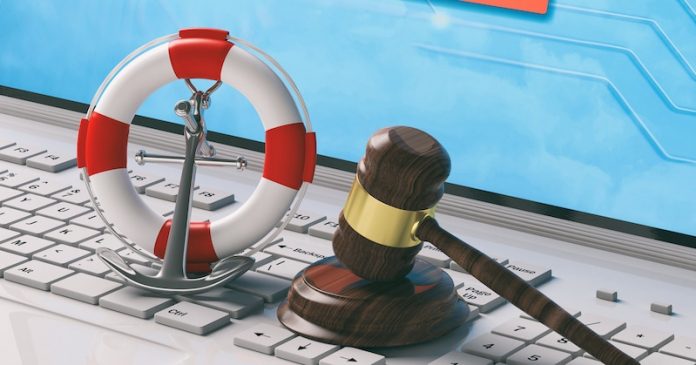This article is written by Adarsh Vasudeva pursuing LLB from Government law college, Mumbai. The article is written under the guidance of Mr Nizamuddin Ahmad Siddiqui Sir who is Senior Research Fellow at Jindal Global Law School. It contains inputs from the webinar conducted by Sir on An Introduction to Maritime Law. The webinar was organized by LawSikho on Friday, 29th May 2020.
Professor Ram Prakash Anand in his seminal work, Origin and Development of the Law of the Sea (Martinus Nijhoff, 1963) writes, ‘Practically every history of modern international law…points out that the present system of international law originated only in the sixteenth and seventeenth centuries after the discovery of America in 1492 and the sea route to India in 1498, in the relations amongst European states.’ (pg. 02)
India is surrounded by water on three sides and has given great importance to maritime affairs since millennia. It has continued to receive and send ships on and from its shores since thousands of years. However, the legal regulation of sea-affairs has only taken shape in the last few hundred years; with domestic laws getting fixed more recently.
Under the British imperial rule maritime affairs in India were governed through a number of legislations, inter alia – The Coasting Vessels Act, 1838; Indian Registration of Ships Act, 184; Admiralty Offences (Colonial) Act; 1849; Indian Ports Act, 1908; Inland Steam Vessels Act, 1917; and, Control of Shipping Act, 1947.
Table of Contents
What is Maritime Law?
Also known as Admiralty Law, the nature of Maritime Law is private in nature. Its public law counterpart is known as the Law of the Sea.
The bulk of Maritime Law handles the process of carrying goods through sea, rules concerning protection and maintenance of ships at sea, registration and damage to ships, marine insurance etc.
Some of the major topics that any course on Maritime Law, therefore, covers are – contract of carriage (bill of lading, charter party agreement); incidents of navigation (collision, salvage/towage); marine insurance (marine policy, insurable interest, indemnity); marine pollution (liability claims, public law regime, environment protection and natural resource conservation) etc.
The Law of the Sea, on the other hand, lays down general principles related to maritime zones, rules of mining, exploitation of natural resources, dispute settlement (boundary dispute, dispute related to resource allocation/ exploitation), piracy, jurisdictional claims, issues in hot-pursuit etc.
International Maritime Organization (IMO)
The International Maritime Organization is an international organization mandated to regulate and govern maritime affairs at global level. Its main task is to facilitate international agreements on issues of relevance, regulate maritime affairs and provide the technical expertise on important subject areas. The official website of IMO provides the following information about the scope of its function:
The majority of conventions adopted under the auspices of IMO or for which the Organization is otherwise responsible, fall into three main categories. The first group is concerned with maritime safety; the second with the prevention of marine pollution; and the third with liability and compensation, especially in relation to damage caused by pollution. Outside these major groupings are a number of other conventions dealing with facilitation, tonnage measurement, unlawful acts against shipping and salvage, etc.
Why should one study Maritime Law?
There are many reasons why one should choose to study Maritime Law:
- History of Civilizational Interactions – maritime commerce paved way for one of the first civilizational interactions (Vasco da Gama, Christopher Columbus, John Selden, Hugo Grotius etc.)
- Interdisciplinary Understanding – exposes one to the geographical world of sea-routes, mechanics of ship-functioning, history of human trade and suffering etc.
- Maritime Trade and Commerce – maritime commerce remains one of most prominent forms of international trade [trade in Indian spices since centuries, RP Anand, Origin and Development of the Law of the Sea (Martinus Nijhoff, 1963), pg. 14].
- Prospects of Growth – the bulk of commercial transaction through sea holds great economic potential (90% of world’s trade happens through sea route – see here).
- Never a Dull Moment – sea offers an open space; and who wishes to look the other way!
- Learning Maritime Law also has an emotional appeal – an appreciation for sea-life which is hardly experienced by most of the world’s population; the joy of adventure being on/surrounded by the ship; openness of thought and expression being exposed to the world of endless opportunities (fascinating stories about sea adventure – here and here).
How should one study Maritime Law
Maritime Sector for Non-Law Background Students
- One not having law background/degree cannot contribute directly to the legal sector.
- Knowledge of the sea-life allows better understanding of sea-based economic activities which is drastically different from what happens on the land.
- Gaining technical knowledge about sea-based commercial transactions is in itself a great fascination – for instance, learning about the various stages in the life-cycle of a ship (ship-building, ship-accidents, salvage/towage, ship breaking etc.); or the various types of commercial contracts (free on board, cost/freight, cost/insurance/freight etc.)
What are the career opportunities available for a Maritime Lawyer
- Contract Specialist – drafting contracts and standard-setting procedures for better conveyancing.
- Litigation Expert – regular litigations before domestic and/or foreign courts and specialized tribunals.
- Settlement Facilitator – arbitrating and/or mediating a dispute between represented parties.
- State Counsel – representing state and/or governmental agencies in various capacities.
- In-House Representatives – facilitating dispute settlement processes on behalf of law firms and/or other corporate entities in a representative capacity.
What is it like to work as a Maritime Lawyer
- Maritime lawyers have licensed lawyers whose primary focus is on legislation pertaining to any maritime activity. In cases related to seas, oceans and other open water bodies they represent clients or businesses. Today, maritime law as one of the oldest branches of law covers a wide range of issues, from injuries and working conditions at sea to shipping and commerce.
- A Maritime Lawyer works like any other lawyer – drafting commercial, insurance and/or indemnity contracts; handling individual lawsuits involving contractual and/or tortious claims; representing governmental and/or corporate agencies in before judicial or executive authorities; negotiating dispute settlement clauses/processes; reviewing already existing agreements etc.
- The work scope engages a diversity of areas – tortious liability (oil-spill and damage to marine life, acts of nuisance and/or personal misbehaviour); contractual claims (damage to goods, non/ill-performance of contracts); and, insurance claims (marine insurance, indemnity). There may also be some overlaps with public law issues – security claims (public law concern) (unwarranted movement within territorial zones, acts threatening state security); criminal law (public law concern) (issues of piracy on high seas, jurisdictional claims for criminal acts in territorial zones) etc.
- They can range from injuries and working conditions at sea, cargo, shipping and trade, any kind of illegal activity occurring at sea and cover both business and pleasure. This makes a maritime career not only exciting but also challenging. Maritime law not only differs from onshore laws, but these cases will fall under the line of the respective country depending on the flags that the ships are flying.
- One day, you can find yourself arguing in court, another day writing papers and the next week, negotiating settlements and addressing concerns about accidents or illnesses caused by seafaring boats, and on another day, you are investigating allegations about a corporation dumping hazardous waste into the waters near where they live.
- Marine lawyers may also advise parties to litigation surrounding the capture or release of a marine vessel, collecting fees or receiving compensation from vessel owners in the event of an incident, collision or sinking. In addition, maritime lawyers need to examine a variety of issues such as the assessment of ferry liability or the environmental case of exploitation.
- In the beginning of his/her career, a maritime lawyer can earn anywhere between Rs.10,000 and Rs.25,000. But as valid experience and time are invested the salary increases. If you succeed and, more importantly, stand out in the maritime rule, you will take high rewards home. Generally reputed maritime lawyers charge at least 1.5 lakh per hearing session in various high courts and/or the Indian Supreme Court.
Important Skills for a Maritime Lawyer
- Be thorough with the required acts – Merchant Shipping Act, Admiralty Act etc.
- Having a basic idea of International Law, especially the Law of the Sea.
- Basic understanding of the work of IMO and other maritime bodies.
- Arbitrations skills are prerequisite.
- Readiness to work thoroughly and at odd hours.
- Attentiveness and insightful due to the involvement of high stakes.

What could be pitfalls or probable hiccups, if any, for any Maritime Law Professional
- Limited exposure to disciplinary technical knowledge – International Commercial Terms (INCOTERMS); phraseology used for ships (sea-worthiness, bill of lading, general average etc.)
- Limited understanding about the disciplinary diversity – contractual claims arising out of the nature of the contract; tortious claims arising out of ill-performance of the ship (ship-breaking claims, salvage/towage claims etc.); arrest and detention (illegal venturing into territorial zones); environmental harms (oil-spill overs).
- Limited access to relevant opportunities – maritime law practice in India remains a niche area, though with endless opportunities.
What are the major law firms, organizations, institutes that offer Maritime Law courses and skill-development programs in India and abroad
Learning Opportunities (List of Academic Programs/Universities)
- LLM in International Commercial and Maritime Law, Hillary Rodham Clinton School of Law, Swansea University, U.K.
- LLM Maritime Law, School of Law, University of Southampton, U.K.
- LLM in Admiralty and Maritime Law, Tulane Law School, Tulane University, U.S.
- LLM in Maritime Law, National University of Singapore, Singapore.
- LLM in Maritime Law, Scandinavian Institute of Maritime Law, University of Oslo, Norway.
- LLM in International Maritime Law, International Maritime Law Institute (IMLI), University of Malta, Malta.
- LLM in Shipping Law, University of Cape Town (UCT), South Africa.
- LLM in Maritime Law, Schulich School of Law, Dalhousie University, Canada.
- LLM in Maritime Law, City University of London, U.K .
- LLM in Maritime Law, School of Law, University of Miami, U.S.
- LLM in Maritime Law/ PG Diploma in Maritime Law, Gujarat Maritime University, India.
Training and Internship Opportunities (List of Law-Firms)
- Tier 1 Firms – Bose & Mitra & Co.; Brus Chambers, Advocates and Solicitors; ZBA.
- Tier 2 Firms – Mulla & Mulla & Craigie Blunt & Caroe.
- Tier 3 Firms – ALMT Legal; Classics Law; Singhania & Co.

Professional Engagement Opportunities (List of Leading Organizations)
- Comité Maritime International, Antwerp, Belgium
- International Maritime Organization, London, UK
- International Maritime Law Institute, Malta
- Indian Maritime Law Association, Mumbai, India
- Directorate General of Shipping, Ministry of Shipping, Government of India
What is the future of Maritime Law in India
- The Indian Ocean is projected to become a dominant global geopolitical and economic force in the 21 century (see here).
- Draft National Maritime Policy (NMP) which has not yet been promulgated stands on two pillars – first, transitioning India from Brown Economy to Blue Economy (see here); second, framing holistic maritime security.
- Prime Minister Narendra Modi has identified Blue Economy as a tool for India’s development while putting emphasis on the protection of shared marine spaces and seeking ‘Security and Growth for All in the Region’ (SAGAR) (see here).
- Federation of Indian Chambers of Commerce and Industry (FICCI) produced a detailed report on Blue Economy Vision 2025: Harnessing Business Potential for India Inc and International Partners. The Report also captures the vision of PM Modi through his SAGAR approach.
- The blue economy would reinforce and strengthen the efforts of the Indian government as it strives to achieve the SDGs of hunger and poverty eradication along with sustainable use of marine resources by 2030.
- Marine services sector could serve as the backbone of its blue economy and help India become 10 trillion-dollar economy by 2022.
- Chief identifiable sectors to grow in the Blue Economy – fishing, marine biotechnology, minerals, marine renewable energy, marine manufacturing, shipping/port/maritime logistics, marine tourism/leisure, marine construction, marine commerce, marine ICT, education/research (see here).
- The broad contours of India’s maritime security strategy may be initiated by reading the October 2015 edition of the Indian Naval Strategic Publication (NSP) 1.2, titled, “Ensuring Secure Seas: Indian Maritime Security Strategy” (see here).
- Across Asia, the reach of maritime activity is growing, as the focus of the shipping industry moves for this purpose to the many countries present. Thanks to the high shipping volume, ports such as Shanghai, Shenzhen, Hong Kong and Singapore are the busiest ports in the world (see here).
Guiding Notes and Reading Material
Following is a brief source guide to exploring the subject further:
List of Standard Books
Covering mostly US and UK jurisdictions:
- Simon Baughen, Shipping Law, 4th ed. (Routledge-Cavendish, 2009)
- Clive M. Schmitthoff and David AG Sarre, Charlesworth’s Mercantile Law, 14th ed. (Steven and Sons: London, 1984)
- Stephen Girvin, Carriage of Goods by Sea, 2nd ed. (Oxford University Press, 2011)
- Susan Hodges & Christopher Hill, Principles of Maritime Law (London: LLP, 2001)
- Aleka Mandaraka Sheppard, Modern Admiralty Law, 1st ed. (Cavendish Publishing House, 2001)
- Robert Force, AN Yiannopoulos and Martin Davies, Admiralty and Maritime Law (Abridged Edition) (Beard Books: Washington, D.C., 2006)
Covering Indian jurisdiction
- Indira Carr and Peter Stone, International Trade Law, 4th ed. (Routledge-Cavendish, 2010)
- Samareshwar Mahanty, Maritime Jurisdiction and Admiralty Law in India (Universal Publishing House, 2009)
- Avtar Singh, Law of Carriage – Air, Land & Sea, 5th ed. (Eastern Book Company, 2015)
- H. K. Saharay, The Law of Carriage of Goods by Sea and Air, 2nd ed. (Eastern Law House, 2013)
LawSikho has created a telegram group for exchanging legal knowledge, referrals and various opportunities. You can click on this link and join:
 Serato DJ Crack 2025Serato DJ PRO Crack
Serato DJ Crack 2025Serato DJ PRO Crack










 Allow notifications
Allow notifications


